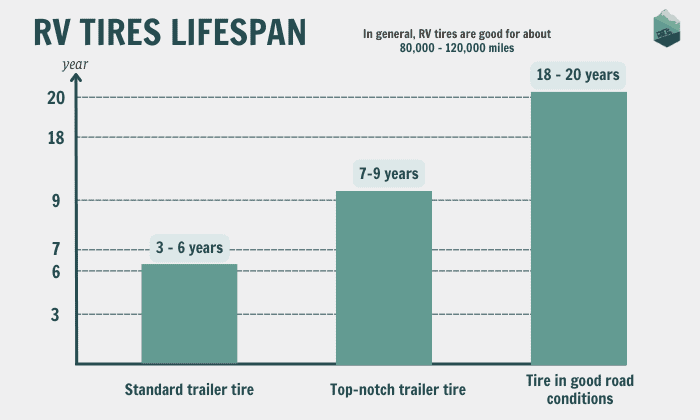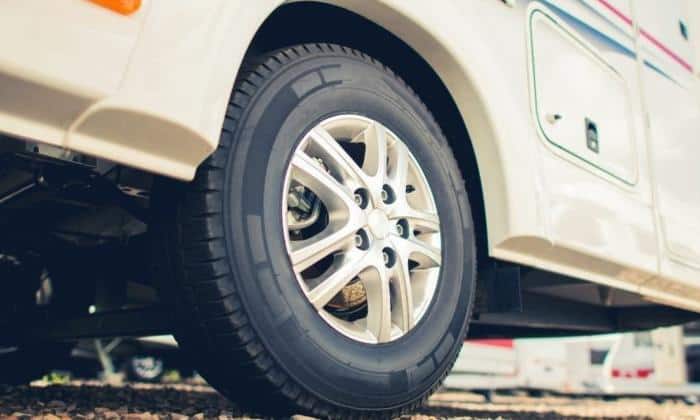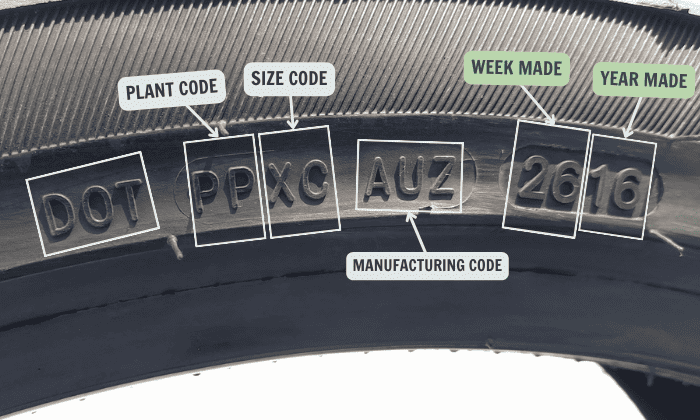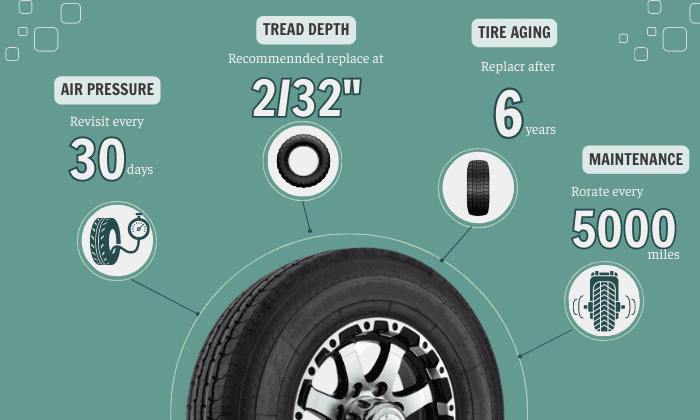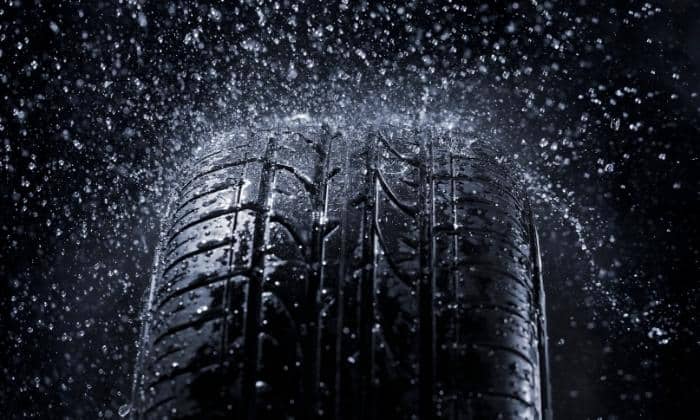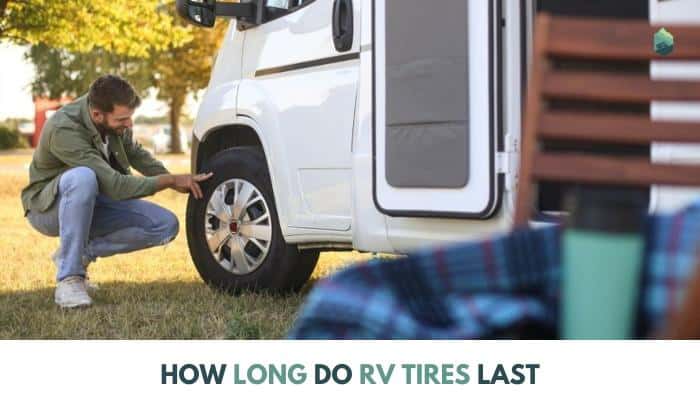
How long should you expect your RV tires to last can vary significantly. In this article, we’ll talk more in detail about those factors and how you can maximize the lifespans of your RV tires.
Page Contents
RV Tires Lifespan
Standard trailer tire lifespan is from 3 – 6 years, and some top-notch products can go as far as 7-9 years. Indeed, it also measures depending on the miles you have put your tires through.
In general, RV tires are good for about 80,000 – 120,000 miles.
But there are many variables that can affect this number. How often do you drive? Are you running on all-terrain or highway terrain? Do you drive in the winter? If so, how often?
For instance, if you only drive 4000 – 5000 miles per day in mostly good road conditions, your tires might be good for use for up to 18 – 20 years.
However, tires that are used for off-road driving or heavy-duty hauling might only last about 3 years with an intense schedule.
How Old is Too Old for RV Tires?
It is true that according to the rule of thumb, RV tires for three to six years, but it is best to follow the manufacturer’s recommendation.
Tires lose their ability to maintain their shape as they age — this means that older tires are less likely to grip the road when you need them most. They also have increased chances of blowouts and tread separation.
Why Should You Replace RV Tires Every Few Years?
RV tires are unique in that they must be able to withstand the rigors of both highway and off-road driving. They also have a lot more weight and stress on them than standard car tires, so they tend to wear out faster.
Travel trailer tires are designed to last anywhere from five years to ten years, depending on how often they’re used and what type of terrain they’re used on.
The more often you drive the RV, the faster its tires will wear out and the risk of hydroplaning or losing control of your vehicle in bad weather conditions increases as well.
If you plan on traveling long distances often or spend more time driving than camping, you’ll want to replace your RV’s tires more frequently as well every four to six years ideally. The more miles you put on your vehicle, the sooner it will need new rubber.
There are several reasons why RV tires be replaced after they have reached their recommended age:
1. Tire Deterioration
RV tires are bad as they age since they lose a lot of their strength and ability to hold up under pressure. Even when idle, your tires will deteriorate over time from exposure to UV rays, ozone and other environmental factors.
As they age, they become less pliable and more prone to cracking or splitting. The rubber compound also breaks down, which can lead to a loss of grip when cornering or braking.
2. Tire Bubbles
This causes the air inside the tire to expand and contract with changes in temperature, which can lead to premature wear.
It’s particularly important for motorhome tires because of their higher tire pressures, which increase susceptibility to internal pressure buildup and cause the sidewall to burst.
3. Flat Spotting
Flat spots develop when one part of the tread encounters too much resistance from the road surface ( like when it’s parked for longer periods) leading to uneven wear patterns and premature flat spotting.
How to Find Out How Old RV Tires Are?
Whether it’s Toyo RV tires or Goodyear RV tires, they are usually only good for a certain amount of miles before they need to be replaced. To determine how many years your tires are, look at the DOT code on the sidewall of each tire.
This is a series of numbers and letters, often starting with “DOT”. The letter code following the DOT number indicates when the tire was manufactured and may help you determine if it’s time to replace them.
The first two numbers indicate the week in which the tire was made. The final two digits indicate the year in which it was made.
For example, a tire marked 1621 has been made during the sixteenth week of 2021, which would be around the middle towards the end of April.
RV Tire Maintenance Tips
1. Check your tires regularly for proper inflation
You need to check your RV’s tires for proper inflation levels at least once per month.
Remember that tires lose pressure over time and that can cause damage to the sidewalls and result in premature wear.
If you notice any cracks or bulges on the sidewalls of your tires, it’s time to replace them immediately. Also, be sure to check your spare tire at this time as well.
2. Rotate your tires every 5,000 miles
This will help prevent uneven tread wear, which could lead to blowouts on rough roads or during hard cornering maneuvers.
3. Don’t overload your RV with extra weight
Always follow manufacturer recommendations regarding maximum load capacity ratings, both while driving down the road and while parked.
4. Don’t overwash your tires. Invest in quality water-based tire products
Washing them too often. This can cause the tire to dry out and crack, which will lead to more frequent replacements.
Focus on keeping them clean with a water-based cleaner that won’t damage the slow-aging chemical on the tire’s surface.
FAQs
How many miles are RV tires good for?
Normally, RV tires can last 8,000 to 12,000 miles, which translates to about 3 to 6 years if you frequently drive your RV.
How long should tires last on a Class A RV?
The life expectancy of a set of tires depends on many factors even on a Class A RV. However, their tires are much more durable and heavy-duty compared with Classes B and C. The RV tires cost for this type tend to run higher than average amounting to $300 each.
The general rule of thumb is measuring the depth of your tread with a minimum of 2/32 inches. As with any vehicle, proper maintenance will play an important role in maximizing tire life for your motorhome.
Do RV tires have an expiration date?
The short answer is yes. The expiration dates range from five to ten years but manufacturers would recommend replacing your tires 6 years after the manufactured date regardless of usage frequency.
Tires have a limited shelf life before they start to lose their ability to perform properly on the road which makes them a risk. It’s important to keep track of the date when you bought your tires so you know when they need to be replaced. You can find this on the DOT stamped on the sidewalls.
What is the average life of Michelin RV tires?
Michelin tires are renowned for their quality and durability, so you can expect them to last a long time. However, the exact lifespan of a Michelin tire depends on a number of factors.
To be safe, make sure to get your tires checked out after five years. 10-year-old RV tires after the manufacture date would be the greatest stretch possible but it isn’t recommended, especially if your rig is often used.
What are the tire replacement recommendations?
RV tire replacement recommendations depend on the type of tire and the way they are maintained. It is also important to note that generally you can’t use regular tires for your camper. You must use fifth wheel tires or dedicated RV tires for this.
Even RV tires come in different types with 22.5 tires used on the smaller rigs. The more common brands include Toyo, Goodyear, and Michelin. But while they have differences, tire life is generally the same.
Conclusion
Hopefully, now you feel comfortably informed on the subject of how long do RV tires last. Proper tire maintenance can be key in extending the life of your RV tires. Regular inspections of your tires will help you catch some issues early, and it will also ensure that your tires are able to perform the way they should.
Be sure to remember these tips for helping extend the lifespan of your RV’s tires if you want to enjoy them for as many miles as possible.

My career journey has been marked by a variety of roles. I served as a Personal Trainer for Children, Fitness Instructor, and Home-Based Consultant in Detroit Wayne Integrated Health Network.
More than ten years of traveling in my caravan have lent me a deep appreciation of freedom. Without the shackles of being tied down to one place, I get to explore many parts of the world and relish the exhilaration that comes with discovering new things. Throughout my journey, I have been a member of FMCA (Family Motor Coach Association) since 2020. Thus, living on the road has never become boring for me.
As someone with a burning passion for traveling, I want to inspire others to adopt a nomad lifestyle to appreciate the beauty of the world. This, of course, requires a functioning vehicle that can always make you feel at home, even when you’re far away from modern life.
Therefore, I seek to put my experience to good use—helping you with your adventure on the road. As a result, I launched and managed the Outdoorbits website, where I likely share my enthusiasm for outdoor activities and health-related insights.
